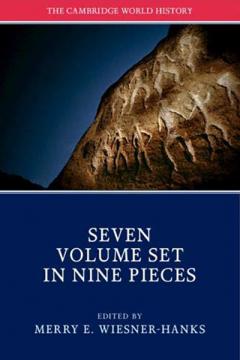The Cambridge World History is an authoritative new overview of the dynamic field of world history. It covers the whole of human history, not simply history since the development of written records, in an expanded time frame that represents the latest thinking in world and global history. With over two hundred essays, it is the most comprehensive account yet of the human past, and it draws on a broad international pool of leading academics from a wide range of scholarly disciplines. Reflecting the increasing awareness that world history can be examined through many different approaches and at varying geographic and chronological scales, each volume offers regional, topical, and comparative essays alongside case studies that provide depth of coverage to go with the breadth of vision that is the distinguishing characteristic of world history.
Merry E. Wiesner-Hanks is a Distinguished Professor and Chair of the History Department at the University of Wisconsin, Milwaukee. She began her scholarly career as a historian of early modern Europe, with a particular focus on women and gender, and remains a leader in that field, serving as the president of three scholarly societies and since 1996 as the Senior Editor of the Sixteenth Century Journal. Since 2000 she has also moved into world and global history, and now serves as one of the editors of the Journal of Global History. She is the author or editor of twenty books and many articles that have appeared in English, German, Italian, Spanish, French, Greek, Chinese, Turkish, and Korean. These include Early Modern Europe 1450–1789, 2nd edition (Cambridge, 2013), Women and Gender in Early Modern Europe, 3rd edition (Cambridge, 2008), Christianity and Sexuality in the Early Modern World: Regulating Desire, Reforming Practice, 2nd edition (2010) and Gender in History: Global Perspectives, 2nd edition (2010). Her research has been supported by grants from the Fulbright and Guggenheim Foundations, among others.

